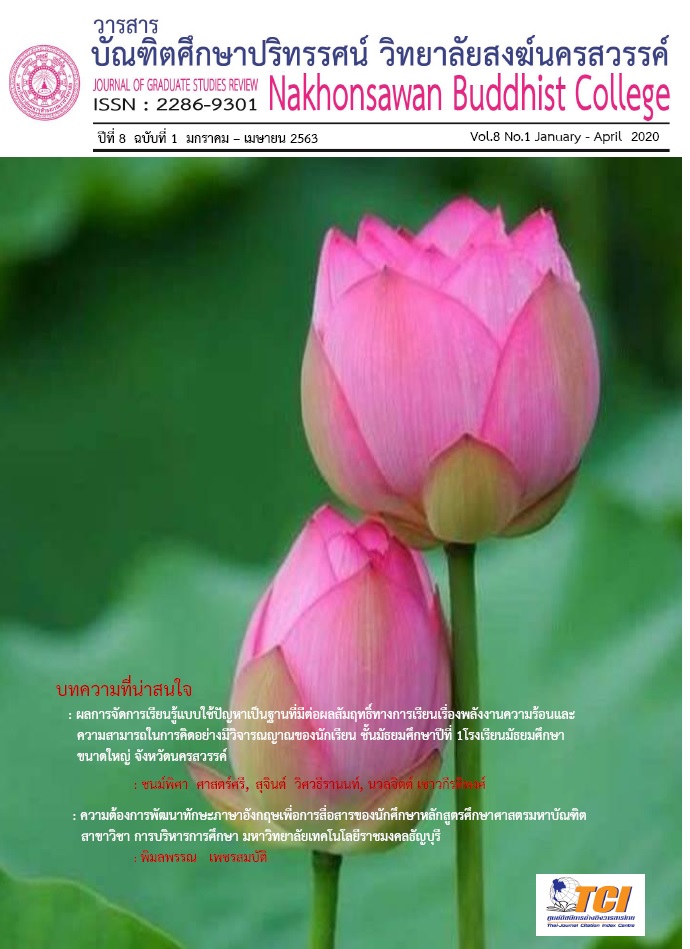พุทธวิธีการพัฒนาศักยภาพของบุคลากรองค์การบริหาร ส่วนตำบลหนองปลิง จังหวัดนครสวรรค์
Main Article Content
บทคัดย่อ
งานวิจัยฉบับนี้ มีวัตถุประสงค์คือเพื่อนําเสนอแนวทางการใช้หลักธรรมในการพัฒนาศักยภาพของบุคลากรองค์กรปกครองส่วนท้องถิ่น จังหวัดนครสวรรค์
ระเบียบวิธีวิจัยเป็นแบบผสานวิธี โดยส่วนแรกจะ ศึกษาวิจัยเชิงคุณภาพ เพื่อให้ทราบถึงประเด็นของการศึกษาในรายละเอียด ที่สำคัญ และมีความครอบคลุมในเนื้อหาสาระสำคัญที่ทำการศึกษาอย่างครบถ้วน พร้อมกันนั้น ในการ วิจัยเชิงคุณภาพจะทำให้ได้ทราบถึงข้อมูลเชิงลึก ที่มีรายละเอียดชัดเจนสามารถนำมาวิเคราะห์ในเชิงตรรกะได้ ส่วนที่สองจะทำการศึกษาเชิงปริมาณ เพื่อให้เกิดความน่าเชื่อถือในเชิงประจักษ์ข้อมูล และวิเคราะห์ให้ทราบถึงเหตุผลที่มีส่วน สัมพันธ์กันกับข้อมูลในเชิงคุณภาพ และอุดช่องจุดด้อยของข้อมูลเชิงคุณภาพดังนั้นเพื่อให้การวิจัย เป็นไปตามระเบียบ วิธีการ ผู้วิจัยจะนำเสนอวิธีการวิจัยตามลำดับ
ผลการวิจัยพบว่า
- สภาพทั่วไปและปัญหาอุปสรรคของการพัฒนาศักยภาพบุคลากรขององค์การบริหารส่วนตำบลหนองปลิง จังหวัดนครสวรรค์ ผู้ตอบแบบสอบถามส่วนใหญ่มีสถานะสมรส ร้อยละ 85.60 เป็นเพศชาย ร้อยละ 65.25 มีอายุระหว่าง 31 - 40 ปี ร้อยละ 51.69 มีการศึกษาปริญญาตรี ร้อยละ 75.42 เป็นข้าราชการ ร้อยละ 70.33 และมีประสบการณ์ในการทำงาน 6 - 10 ปี ร้อยละ 49.15 สำหรับการพัฒนาศักยภาพบุคลากรขององค์การบริหารส่วนตำบลหนองปลิง จังหวัดนครสวรรค์ในภาพรวม พบว่า ด้านการฝึกอบรม ด้านการศึกษาด้านการพัฒนา รวมทุกด้านอยู่ในระดับปานกลาง (x̄ = 3.04,S.D. = 0.698) และเมื่อพิจารณาเป็นรายด้าน พบว่า อยู่ในระดับปานกลางทุกด้าน
- 2. แนวคิด ทฤษฎี และหลักพุทธธรรมที่เกี่ยวกับการพัฒนาศักยภาพบุคลากรของ องค์การบริหารส่วนตำบลหนองปลิง จังหวัดนครสวรรค์ คือ 1) ด้านการฝึกอบรม จัดโครงการฝึกอบรมบุคลากรเพื่อพัฒนาความรู้ ความสามารถ และทักษะ ตามความแตกต่างของแต่ละบุคคล การฝึกอบรมขั้นศีล คือ ปรับแก้การแสดงออกของพฤติกรรมกาย วาจา ขั้นสมาธิ คือ พัฒนาจิตใจให้มีสภาวะอดทน ขั้นปัญญา คือ ชี้แนะให้เห็นพฤติกรรมที่ควรกระทำหรือไม่ควรกระทำ 2) ด้านการศึกษา ได้ส่งเสริมให้บุคลากรศึกษาต่อในระดับการศึกษาที่สูงขึ้นเพื่อพัฒนาความรู้ ความสามารถ ขั้นศีล คือ ปรับเปลี่ยนพฤติกรรมด้วย ระบบการศึกษา ขั้นสมาธิ คือ พัฒนาพฤติกรรมจิตใจให้มี EQ ขั้นปัญญา คือ ให้มีการศึกษาเพิ่มเติม 3) ด้านการพัฒนา ขั้นศีล คือ ให้การบ่มเพาะพฤติกรรมนิสัยที่ดีงาม ขั้นสมาธิ คือ ฝึกจิตใจให้เป็นในทิศทางที่ควร ขั้นปัญญา คือ ส่งเสริมพัฒนาให้มีการศึกษาเพิ่มเติม ส่วนการพัฒนาศักยภาพ คือ กลุ่มของความรู้ (knowledge) ทักษะ (skills) และคุณลักษณะ (attributes) ที่เกี่ยวข้องกัน ซึ่งมีผลกระทบต่องานหลักของตำแหน่งงานหนึ่ง ๆ โดยกลุ่มความรู้ ทักษะ และคุณลักษณะดังกล่าว สัมพันธ์กับผลงานของตำแหน่งงานนั้น ๆ และสามารถวัดผลเทียบกับมาตรฐานที่เป็นที่ยอมรับ และ เป็นสิ่งที่สามารถเสริมสร้างขึ้นได้ โดยผ่านการฝึกอบรมและการพัฒนา
- 3. แนวทางการพัฒนาศักยภาพบุคลากรขององค์การบริหารส่วนตำบลหนองปลิง จังหวัดนครสวรรค์ตามแนว พระพุทธศาสนา ซึ่งมีองค์ประกอบ คือ จะต้องเริ่มจากกระบวนการหรือวิธีการพัฒนาทรัพยากรบุคคล ใน 3 ด้าน คือ T (training) การฝึกอบรม, E (education) การศึกษา และ D (development) การพัฒนานามาบูรณาการกับหลักพระพุทธศาสนา คือ หลัก ไตรสิกขา คือ ศีล สมาธิ และปัญญา จะก่อให้เกิดศักยภาพของบุคลากร ใน 3 ด้าน คือทางด้านความรู้ ด้านทักษะ และด้านพฤตินิสัยที่พึงประสงค์ ดังนั้น แนวทางการพัฒนานี้สามารถนำหลักธรรมทางพระพุทธศาสนามาประยุกต์ใชในการ พัฒนาศักยภาพบุคลากร ได้อย่างมีประสิทธิภาพ
Article Details
ประเภทบทความ
บทความวิจัย (Research Articles)


